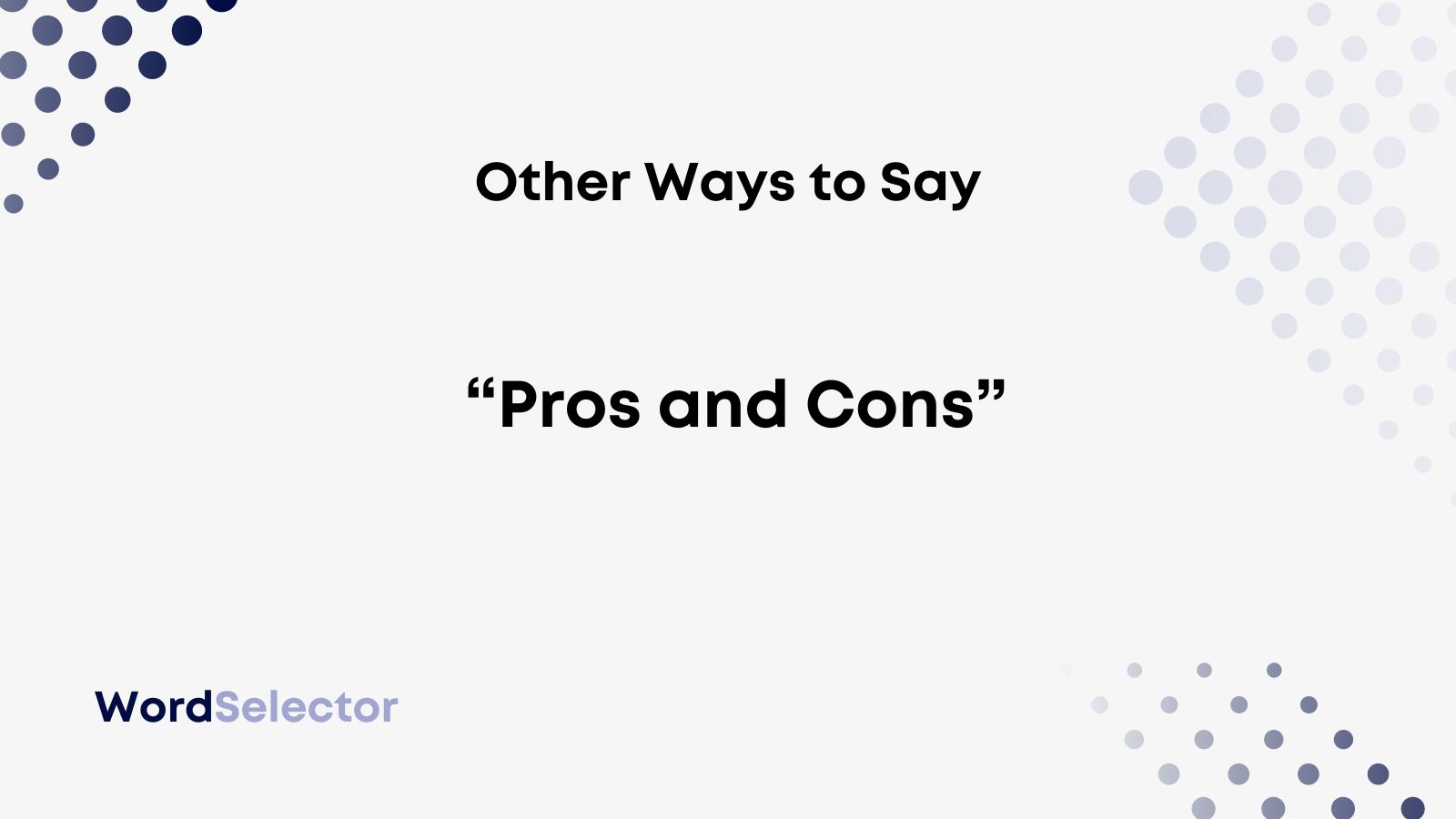If you’re writing an argumentative essay, it’s essential to set out all the points and counterpoints relevant to your topic. However, is the phrase “pros and cons” suitable to include in academic writing?
We’re here to answer that question while also providing some great alternative phrases that you can use in your formal, academic, or professional writing.
Other Ways to Say “Pros and Cons”
- Advantages and disadvantages
- Trade-offs
- Benefits and drawbacks
- Upsides and downsides
- Assets and liabilities
- Costs and benefits
- Opportunities and obstacles
- Strengths and weaknesses
- Positives and negatives
- For and against
- Ups and downs
- Merits and demerits
- Gains and losses
- Implications
- Criteria
- Considerations
- Aspects
- Factors
- Circumstances
- Variables
KEY TAKEAWAYS
- The phrase “pros and cons” can be used in an essay.
- If you want a more formal alternative to this phrase, you can use “advantages and disadvantages” instead.
- “Trade-offs” is a great one-word alternative to “pros and cons” that you can use in business and professional settings.
Don’t click away just yet! Keep reading to see how we use our choice of synonyms for “pros and cons” in a few examples.
Thereafter, we’ll discuss whether the phrase “pros and cons” is suitable to use in an academic essay.
Advantages and Disadvantages
If you’re wondering how to say “pros and cons” formally, we would recommend the classic phrase “advantages and disadvantages.”
This phrase is a direct synonym for the original phrase. In general, they can be used interchangeably. Nonetheless, it never hurts to find other words for “pros and cons” to keep your writing diverse.
Moreover, “advantages and disadvantages” is not necessarily a better phrase than “pros and cons” in every circumstance. However, it may be better suited for formal writing, such as an essay. Although “pros and cons” isn’t slang per se, it can come across as less formal.
Therefore, if you’re writing an essay that requires strictly formal and academic phrasing, it’s a good idea to use this alternative instead to be safe.
Finally, let’s see a few examples making use of this phrase:
This paper will set out the advantages and disadvantages of remote working for employees in the corporate and commercial realms.
There are both advantages and disadvantages to the use of a placebo on our participants, many of which have been recorded below.
Trade-offs
Another term for “pros and cons” is “trade-offs.” Essentially, this phrase refers to something negative that you must accept if you want to obtain something positive. In other words, it’s a “con” that you must accept if you want to enjoy the “pro.”
This is one word for “pros and cons” that you can frequently use in business and professional settings. It can also be used in academic writing, depending on the topic.
It is not a direct synonym for “pros and cons.” However, it may be a better phrase to use to refer to a balance you have to strike between the positives and negatives in a particular situation.
To see what we mean, consider the following examples:
The job pays well, but there are a few trade-offs, including the long working hours.
The trade-offs of parliamentary sovereignty are becoming more present in countries like the UK.
Is “Pros and Cons” Formal?
“Pros and cons” is a fairly generic phrase that is neither very formal nor informal. Therefore, it can be used in academic writing from time to time.
It is normal to set out the pros and cons of something in an argumentative essay. However, usually the fact that you are setting these out is subtext. Therefore, it won’t always be necessary to use the phrase “pros and cons” explicitly before you set out your advantages and disadvantages.
Nonetheless, there’s nothing inherently wrong with using this phrase. If you’re unsure, you can always check with the person who will be marking your paper first. Ask them if they’d prefer an alternative phrase.
If you want to keep our list of alternatives on hand for your future writing pursuits, go ahead and bookmark this page. Come back at any time!

